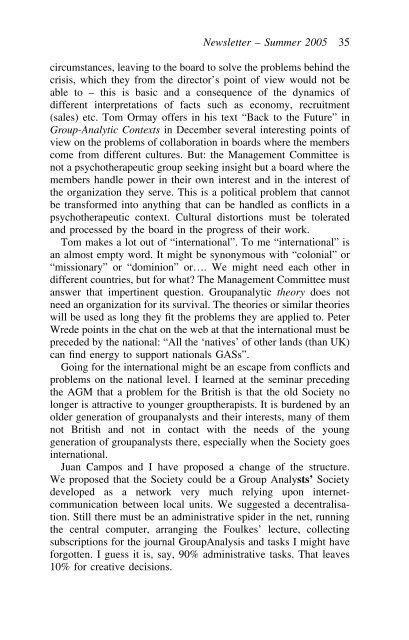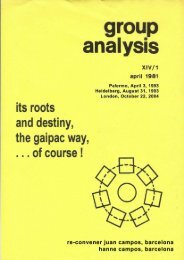Contexts June 2005. Issue 28 - Group Analytic Society
Contexts June 2005. Issue 28 - Group Analytic Society
Contexts June 2005. Issue 28 - Group Analytic Society
Create successful ePaper yourself
Turn your PDF publications into a flip-book with our unique Google optimized e-Paper software.
Newsletter – Summer 2005 35<br />
circumstances, leaving to the board to solve the problems behind the<br />
crisis, which they from the director’s point of view would not be<br />
able to – this is basic and a consequence of the dynamics of<br />
different interpretations of facts such as economy, recruitment<br />
(sales) etc. Tom Ormay offers in his text “Back to the Future” in<br />
<strong>Group</strong>-<strong>Analytic</strong> <strong>Contexts</strong> in December several interesting points of<br />
view on the problems of collaboration in boards where the members<br />
come from different cultures. But: the Management Committee is<br />
not a psychotherapeutic group seeking insight but a board where the<br />
members handle power in their own interest and in the interest of<br />
the organization they serve. This is a political problem that cannot<br />
be transformed into anything that can be handled as conflicts in a<br />
psychotherapeutic context. Cultural distortions must be tolerated<br />
and processed by the board in the progress of their work.<br />
Tom makes a lot out of “international”. To me “international” is<br />
an almost empty word. It might be synonymous with “colonial” or<br />
“missionary” or “dominion” or…. We might need each other in<br />
different countries, but for what? The Management Committee must<br />
answer that impertinent question. <strong>Group</strong>analytic theory does not<br />
need an organization for its survival. The theories or similar theories<br />
will be used as long they fit the problems they are applied to. Peter<br />
Wrede points in the chat on the web at that the international must be<br />
preceded by the national: “All the ‘natives’ of other lands (than UK)<br />
can find energy to support nationals GASs”.<br />
Going for the international might be an escape from conflicts and<br />
problems on the national level. I learned at the seminar preceding<br />
the AGM that a problem for the British is that the old <strong>Society</strong> no<br />
longer is attractive to younger grouptherapists. It is burdened by an<br />
older generation of groupanalysts and their interests, many of them<br />
not British and not in contact with the needs of the young<br />
generation of groupanalysts there, especially when the <strong>Society</strong> goes<br />
international.<br />
Juan Campos and I have proposed a change of the structure.<br />
We proposed that the <strong>Society</strong> could be a <strong>Group</strong> Analysts’ <strong>Society</strong><br />
developed as a network very much relying upon internetcommunication<br />
between local units. We suggested a decentralisation.<br />
Still there must be an administrative spider in the net, running<br />
the central computer, arranging the Foulkes’ lecture, collecting<br />
subscriptions for the journal <strong>Group</strong>Analysis and tasks I might have<br />
forgotten. I guess it is, say, 90% administrative tasks. That leaves<br />
10% for creative decisions.



